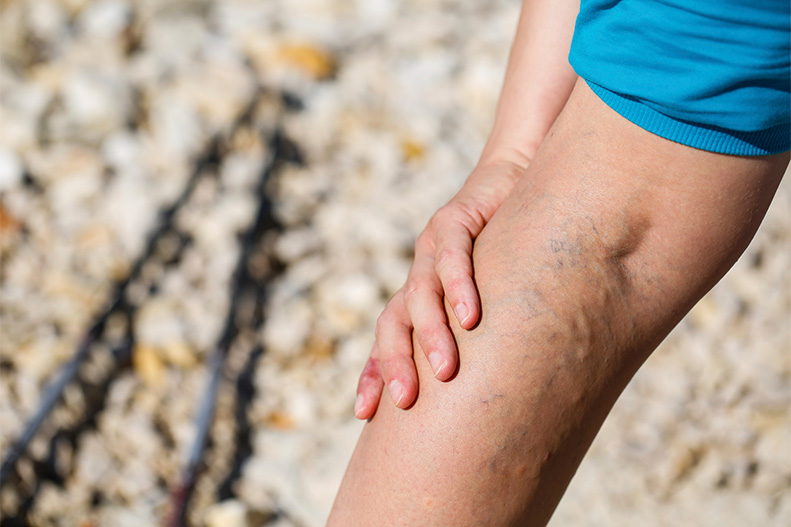If you have varicose veins, your legs may look — and feel — different than they used to. Besides making you feel self-conscious, these large, swollen, twisted veins can also cause pain, aching, or skin changes.
The good news is that there are safe, effective varicose vein treatments that can have you quickly feeling like your old self. From compression socks to changing your patterns of standing and sitting, find out what treatment is right for you.
Learn about your options below, and talk to your doctor about what is best for you.
What Causes Varicose Veins?
Your arteries carry blood out into your body, and your veins return it back to your heart. Your veins count on flaps called valves to open and close the right way to keep blood flowing forward to your heart, instead of backward to your feet.
Varicose veins occur when the valves are not functioning properly.
Varicose vein symptoms
Varicose veins are usually caused by weak or damaged valves that cannot close the right way. This lets blood flow backward, making your veins bulge and swell.
Symptoms of varicose veins include:
- Large, swollen, twisted veins that you can see under your skin.
- Pain, aching, itching, burning, or swelling in your legs.
- Skin discoloration near your ankles.
- Aching or restlessness in the evenings.
Sometimes, there are no symptoms other than the way veins look. In some cases, varicose veins can cause an itchy rash, skin sores called ulcers, or blood clots.
Never Miss a Beat!
Subscribe to Our HealthBeat Newsletter!
Thank you for subscribing!
You can now select the specific newsletters you'd like to receive.
You are already subscribed.
Subscribe to more newsletters in our email preference center.
Sorry, an error occurred. Please try again later.
Get Healthy Tips Sent to Your Phone!
Are varicose veins genetic?
Anyone can have varicose veins, but if your parents or grandparents had them, you’re much more likely to have them as well. They are also more common in women, and in people who spend a lot of time on their feet.
The Difference Between Spider Veins and Varicose Veins
- Varicose veins are enlarged, sometimes bulging, veins that can cause pain and other physical symptoms.
- Spider veins are smaller and more “delicate” in appearance than varicose veins, though they are also visible through the skin. They’re often red, purple, and blue in color and typically do not bulge out from the skin.
Learn more about the treatment of spider veins.
Do Varicose Veins Hurt?
For some, varicose veins cause no pain. But for others, they may lead to significant discomfort.
Varicose veins can cause aching pain, cramping, and feelings of “heaviness” in the legs. They can even cause itching, swelling, and skin discoloration or ulcers.
How Do You Treat Varicose Veins?
Depending on your symptoms, your doctor may suggest changes to your lifestyle. This might include:
- Losing weight.
- Taking regular breaks from sitting or standing.
- Avoiding certain kinds of clothes or shoes.
- Wearing compression stockings.
If your doctor suggests lifestyle changes, you may need to stay off your feet for short periods of time each day. Your doctor will let you know how often to rest and for how long.
If your symptoms are more serious or bothersome, your doctor might recommend:
- Injections, which safely close off the vein and re-route the blood through other healthy veins.
- Ablation, a minimally invasive procedure that uses heat to seal off the vein.
- Stenting, which opens a narrow or blocked vein with a balloon and stent, a metal mesh frame that stays in place to allow for better blood flow.
If you have one of these procedures, your recovery time will vary. In most cases, you can be back on your feet in a few hours or the next day.
Varicose veins and weight loss
Do varicose veins go away after weight loss?
Varicose veins are the result of abnormal function in the valves of your veins. While weight loss may help relieve some of the symptoms of varicose veins, it will not repair them.
Who treats varicose veins?
To learn more about treatments for varicose veins, visit the Vein Centers of the UPMC Heart and Vascular Institute or call 412-802-3333 to make an appointment.[/fc_faq_question]
Have more questions? Check out our blog post on varicose vein frequently asked questions.
Editor's Note: This article was originally published on , and was last reviewed on .
About Vein Center
UPMC’s Vein Centers can help you with a variety of vein problems, whether they’re cosmetic issues or severe diseases. Our vascular surgeons are experienced in treating vein disorders. We offer both surgical and nonsurgical treatments for a variety of conditions, including spider and varicose veins. Those problems affect millions of Americans. Our team uses specialized care and the most advanced treatments possible to help meet your individual needs.
